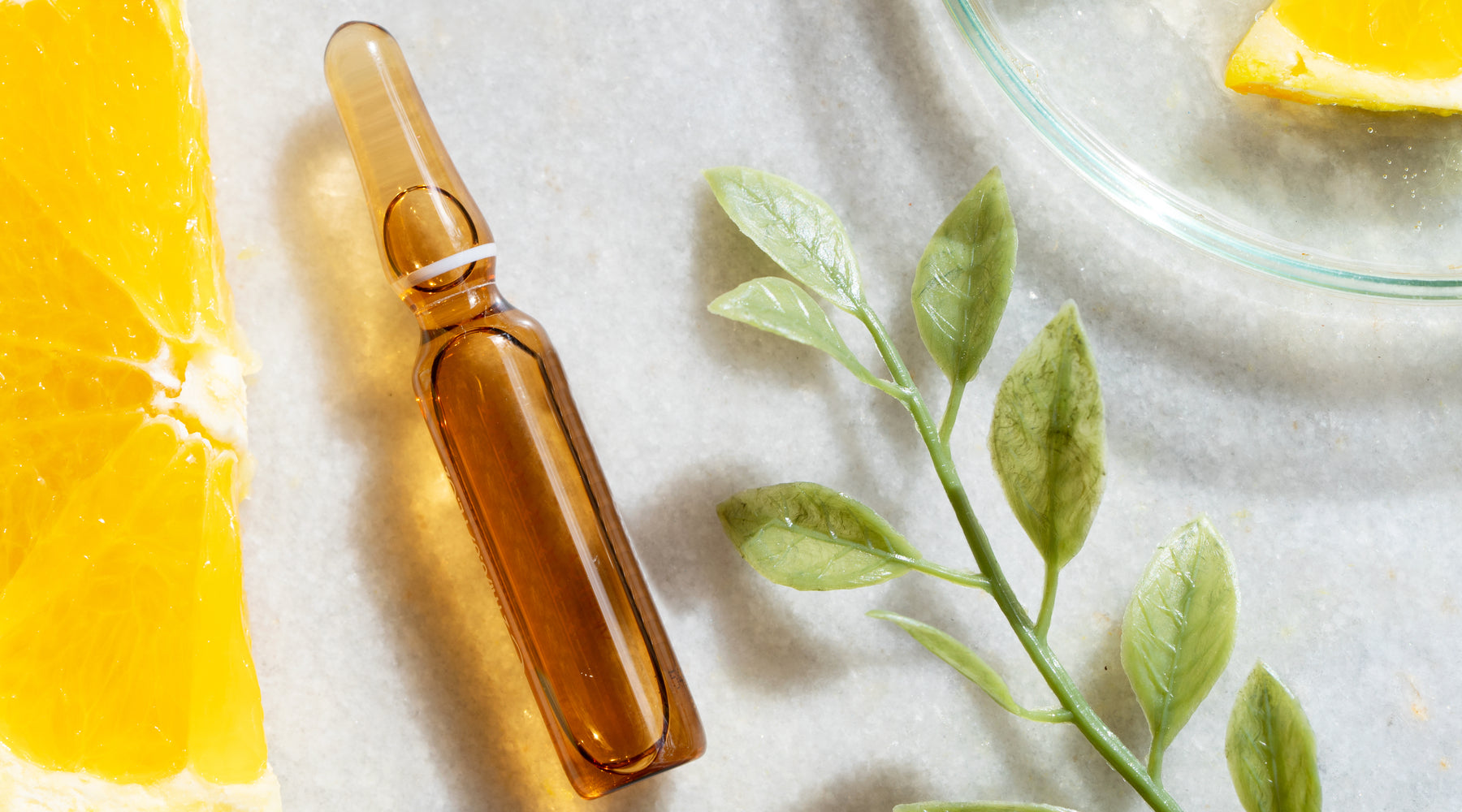
Can Vitamin C Cause Acne? It Depends.
We’ll come right out and say it: vitamin C is not causing your acne.
But if you’re using a vitamin C serum that you suspect may be causing breakouts, we have a couple thoughts on what may be happening.
Note: If the product in question is an oil-based serum (not a water-based product), then please head over to our article specifically covering oil-based vitamin C serums: "Why Your Oil-Based Vitamin C Serum May Be Sabotaging Your Skin."
Otherwise, let’s start by exploring how vitamin C works on your skin.
Vitamin C and Your Skin: a Match Made in Skincare Heaven
There’s a whole alphabet of vitamins out there, and it can be hard to remember which are best for your skin.
Yet if you look at the label of any high quality, glow-inducing skincare product, you’re likely to see vitamin C high on the list of ingredients. This vitamin is popular because it does so many good things for your skin.
But just like any high-profile celebrity, vitamin C can be a little elusive. In fact, your body doesn’t produce vitamin C at all. You have to get it through your diet (think citrus fruits) and through your skincare.
It’s worth the extra effort to add it into your routine, though. Here are just a few of the benefits vitamin C has for your skin:
Protects Skin from Free Radicals
UV exposure from the sun is no joke. In addition to increasing your cancer risk, it can lead to unsightly spots, irregular pigmentation and wrinkles as the years progress.
Vitamin C is not a substitute for sunscreen, but it adds another layer of protection to your skin because it’s an antioxidant. We don’t know about you, but we’ll take all the protection we can get!
Stimulates Collagen Production
You know that plump, youthful skin we all took for granted in our teenage years? Vitamin C is here to help you get a little of it back.
By stimulating collagen production, vitamin C helps to turn back the clock by thickening the tissue underneath your skin and reducing fine lines. Use your C serum long enough and you’ll need to get out your ID for your next margarita order.
Lightens Spots and Uneven Pigmentation
We get it, sun damage happens. (Let she who hasn’t burned her skin to a crisp in the name of a tan throw the first stone.) Thankfully, vitamin C can help with the spotty remnants of those bad decisions.
A good vitamin C serum will lighten pigmentation and reduce the appearance of sunspots, leading to a more even-looking skin tone overall.
Gives You an Incomparable Glow
We believe it was Roald Dahl who said that “good thoughts will shine out of your face like sunbeams and you will always look lovely.” And we’re all for positive thinking.
But on days when your gratitude list comes up a little short and your to-do list a little long, we’re big fans of a dose of antioxidant-rich vitamin C for helping you look vibrant.
Reduces Inflammation
Not only does vitamin C not cause acne, but it can help you treat it. Studies have demonstrated that vitamin C can reduce inflammation, helping to mitigate the symptoms of inflammatory skin issues like acne and psoriasis.
So this leads us to the next question...

If It’s Not Vitamin C, Then What’s Causing My Acne?
Note: If the product in question is an oil-based serum (not a water-based product), then please head over to our article specifically covering oil-based vitamin C serums: "Why Your Oil-Based Vitamin C Serum May Be Sabotaging Your Skin."
There are many contributors that can lead to acne, from your diet and stress levels to the products you use to wash your pillowcases and your hair.
But if you’re finding that you break out specifically when you use a vitamin C serum, there are likely other ingredients in the serum to blame.
For example, we took a look at one of the most highly-searched vitamin C serums on the web and found that it contained isopropyl myristate: a synthetic oil made from propane that is highly comedogenic. (In other words, it’s almost guaranteed to clog your pores.)
The vast majority of Vitamin C serums out there, especially ones with a generous list of synthetic ingredients, contain at least one item that will make you break out--but that item will never be vitamin C.
Okay, But Can Taking Too Much Vitamin C Cause Acne?
So far, we’ve talked about how good vitamin C serums are for your skin, but what about taking vitamin C orally?
Supplementing your diet with Vitamin C has a host of benefits, like reducing chronic disease risk, boosting immunity, fortifying your memory, and of course helping your skin to glow.
But can vitamin C pills cause acne? It depends.
Like we’ve mentioned, your body doesn’t create vitamin C on its own. So you need to get it through a healthy diet that includes foods like broccoli, berries and oranges.
If you’re not eating these foods regularly, a vitamin C supplement may be necessary to help you get the nutrients you need. Meeting those needs with a reasonably-dosed supplement won’t cause acne.
Moreover, vitamin C is water soluble, meaning it’s not stored in your body. So it’s hard to overdose on this particular supplement.
But if you do end up taking in more than your body can handle (we’re talking over 2,000 mg per day), your body may show signs of distress.
This will likely manifest as symptoms like nausea, cramping or a headache, but it’s possible that acne could result, too. After all, acne is simply one of your body’s many ways of telling you something is wrong, please pay attention to me.
So while taking vitamin C orally could theoretically cause acne, you’d have to be taking a lot of it. And you’d likely see other physical symptoms first. If you do experience acne from taking vitamin C, it’s likely a detox reaction. But always check with your doctor if you have concerns.
The Best Way to Use Vitamin C for Acne-Free Skin
If you’re looking to up the glow factor on your skin, a vitamin C serum is the way to do it. (You still need to eat vitamin C-rich foods for your overall health, but applying the vitamin topically is the most effective way to get luminous skin.)
However, you need to choose a vitamin C serum that’s high quality and free of the synthetic, pore-clogging ingredients that lead to breakouts.
The Cryo-C Facial Glow Serum from Wild Ice Botanicals is formulated with a form of pure, lipid-soluble vitamin C called Ascorbyl Tetraisopalmitate. Though it’s significantly more costly than ascorbic acid--the type of Vitamin C used in most other serums--it’s also more deeply penetrating and safer for sensitive skin. (And we've managed to make this serum a friendly price for you nonetheless.)
Combined with protective date seed extract and antioxidant-rich sea buckthorn, our facial serum helps your skin glow--without any of the synthetic stuff that clogs pores and breaks you out.
Like all of Wild Ice’s products, Cryo-C is made with cold-kept ingredients and is refrigerated until it ships to you, maintaining the potency of the ingredients so you get the best results for your gorgeous skin.

